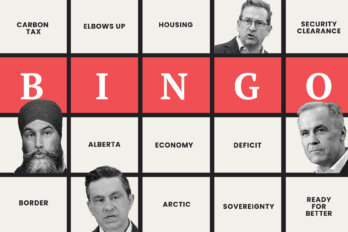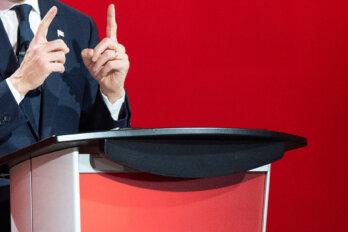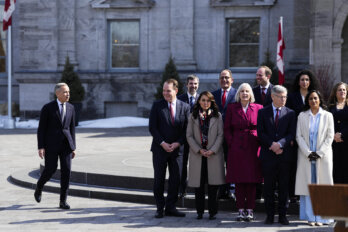This week, NDP candidate Noah Richler was forced to apologize several times for various pre-campaign comments he made about sex, celebrity, terrorism, and politics. His spiciest morsel was an online rant from earlier this year in in which Richler (the son of Mordecai, but also an acclaimed author in his own right) called Stephen Harper a “pathological psychopath” who was secretly rooting for a terrorist attack. If Thomas Mulcair bounces Richler, that quote will be the reason why.
But the real scandal has nothing to do with any dumb thing he wrote on Facebook or Twitter. The real scandal is his driving.
I’m being serious here. He’s just the worst.
Richler and I both moved to Toronto in 1998 as day one recruits at the shiny new National Post. It was a suburban office, and so he went out and bought a car: a VW Bug whose electrical system he almost immediately destroyed after driving the thing into a rain-flooded valley road. (A friend of mine, dating him at the time, told me this was not untypical.) He switched to taxis, and everyone rejoiced.
Seventeen years later—with Richler chauffeuring me around the riding of Toronto–St. Paul’s in his Volvo XC60—it quickly becomes obvious to me that nothing has changed. His driving isn’t dangerous, per se. It’s more of an “Oh that’s okay, Grandma—I’ll drive,” sort of thing. When he finally “parked,” on a side street near his riding’s western boundary he abashedly referenced one of his favourite lines from Annie Hall: “What was it that Woody Allen told Diane Keaton? ‘We can walk to the curb from here’? ”
I look out the window and we’re a good three feet from the sidewalk.
In fact, Richler can quote from a lot of great movies. And books. And poems. And plays. He is cultural polymath, the literary director of Toronto’s Luminato Festival, husband to one of Canada’s leading publishers. He was good friends with Christopher Hitchens, and hob-knobs regularly with Canada’s Gilleratti. His social media posts—about Harper and everything else—are those of an unapologetic intellectual snob. He doesn’t hide it (or didn’t, at any rate, until gagged by the dictates of political life). And so I was sure his campaign style would resemble that of Gandalf presiding haughtily among the hobbits. Tagging along with him on his door-knocking rounds in the southwest corner of his riding, I expected to see a lot of voters smirking at the wizard’s hat and robe.
But that doesn’t happen: To my shock, Noah Richler turns out to be a natural campaigner.
Admittedly, this is a very orange part of the riding. (Half the voters who open their door to us seem to be employed by the government, a public-service union, or an NGO). But even so, his style is deft. He pats dogs. He says hello to babies. He makes odd but endearing comments to their mothers. (“The presence of this child will only enrich your imaginative working life,” he says to one woman on maternity leave.) He speaks broken Italian to unilingual immigrant grandmothers. “Ah you’re from Sicily!” he tells one. “Sicilian white wines are the best!”
“Is that really true? ” I whisper to him as we walk to the next house. “Well,” he answers after a pause, “they offer the best value.”
Politically, this riding is a vestige of the old Toronto—the great urban expanse that Jean Chrétien painted bright red in the 1990s. Carolyn Bennett, a longtime family physician and now chair of the National Liberal Women’s Caucus, has held this seat for eighteen years. And some say she’s gotten comfy: Even many of the Liberal-leaning voters who open their door to Richler tell him they haven’t seen Bennett come around much lately.
“Change is good,” Richler quips as part of his pitch. “There’s a reason Barack Obama has to leave the White House after two terms. It’s a good thing, don’t you think? ”
As in other downtown Toronto ridings, Bill C-51 is a big deal here. With their pledge to repeal it outright, the NDP is at a distinct advantage. (Justin Trudeau’s Liberals have struck a more nuanced position). Richler is doing his best to play the riding’s micro-politics, too. In the northern part of Toronto–St. Paul’s—which is bluer, redder, wealthier—C-51 is far more popular than in this enclave. Richler describes to voters how he hit Bennett on this issue at a September 8 candidates’ forum hosted by one of Toronto’s largest synagogues.
The voters in this neighbourhood are almost monolithically left wing. (On one street, the single Tory sign was taken down, a neighbor reports, “after that whole ‘old-stock’ thing. The guy was really embarrassed.”) But the overwhelming anti-Conservative sentiment is a mixed blessing for the NDP, because the desperate urge to turf Harper has many voters thinking strategically: backing a blue-chip, eighteen-year Liberal veteran over the NDP novice.
“I don’t believe in strategic voting,” Richler tells a middle-aged voter named Doug, who informs us (somewhat wonkily) that his main concern is Senate reform. “I don’t think it’s healthy for democracy if people vote according to the polls or what they’re told by journalists . . . And don’t forget that your vote carries a lot of information. No matter who wins, the percentages send a message. Every election pushes a conversation forward. And that includes a conversation about proportional representation.”
Without further ado, Richler dives into the weeds of the senate issue, trying to address the man’s concern that an NDP government will destroy the Senate outright rather than merely reform it. “I do think we need a chamber of second thought,” Richler assures him. “I believe in a council of elders. But the Senate isn’t fulfilling that role. And think of the other institutions we have. Canada has a role for provinces in our Constitutional scheme, and the strong voice of the Supreme Court. Even without a Senate, we have those things.”
“In any case,” he adds, as the homeowner warms to Richler’s pitch, “getting rid of the Senate would hardly be the NDP’s first order of business.”
Back in the ’90s, he and I worked in adjacent cubicles. We played hockey together. I sublet his apartment. Yet this political smoothness he’s putting on display is a side of him I never knew. What happened to the literary brainiac quoting À la recherche du temps perdu?
As the day wears on, I eventually witness a few nicely high-flown Richlerisms. On Ossington Avenue—a major north–south artery that local lead foots treat as a secondary highway—Richler has to raise his voice slightly to assure a social worker that Mulcair will be able to pay for his promises. “We’re not mad socialists,” he insists, letting slip one of his occasional Britishisms—he was raised in London). “But Mulcair is demanding that corporations pay 2 percent more in taxes. That’s not excessive: Rates have come down nine points in recent years. That money goes to social programs, and policies for addressing climate change.”
“The decisions we make are moral ones,” he says, now suddenly adopting the tone of essayist. “At key points in history, large corporate interests always will try to frighten us away from doing the right thing. Think of what happened in 1842, when the British decided they weren’t going to send children down into the mines anymore . . . business owners complained about that. People decided it was no longer okay to pay black people nothing, and so they abolished slavery. Tommy Douglas decided we needed to help pay for people’s health care. These are things that I call ‘moral moments,’ and I think we are facing a moral moment now with the environment and global warming.”
“That’s uh, probably more than you wanted to hear on a Sunday afternoon,” he adds, eliciting a laugh. The Noah Richler on the hustings is, unlike the somewhat “mad” anti-Harperite who inhabited Facebook, delightfully self-aware, even charming.
At fifty-five, Richler has done a lot and seen a lot. For many years, he produced radio shows for the BBC, a job that took him all over the world, including much of Africa. At a Marchmount Road home, we encounter a young couple—she an actress-turned-full-time-mother, he a worker for Rooftops Canada, an NGO that helps build social housing in Tanzania and Ghana. The couple is surprised to learn that Richler knows all about these countries, having visited them for a radio documentary about child soldiers.
“And so what issues are you voting on? ” Richler eventually asks, as their toddler scurries about. “We just moved back here from the United States,” the man says. “So we’re not completely informed on every issue. But I’m really concerned about Bill C-51.” Chalk up two more votes.
Richler finished up for the day on Carus Avenue, talking about election issues affecting the other end of the age spectrum. The man on the porch is in his fifties but looks more world-weary than that. At the other homes, Richler was doing most of the talking. Here, it’s reversed.
“I had to retire early to take care of mom and pop,” the man says. “The Liberals are taking folks like me in this riding for granted. Nobody cares about seniors.”
“Do you have our seniors pamphlet? ” Richler asks, with a sort of hammy car-salesman gesture that shouldn’t get a smile out of a gruff guy like this, but somehow does. “You know, the NDP has been talking a lot about rolling the age of retirement back to sixty-five.”
“Yeah, well that wouldn’t have helped pops,” the man continues. “Forget sixty-five. He worked till eighty-two, till he just couldn’t do it anymore. Now he’s got no pension. And you have the government [with low interest rates] rewarding the spenders and punishing the savers. We used to be able to bank on 4 percent for our money!”
Richler starts in on a talk about how no Canadian party can really control global interest rates. But he thinks better of it. The guy wants to vent. And a practiced politician—which Richler seems fast on the way to becoming—doesn’t get in the way of that.
In his apology for the unhinged Harper attack, Richler declared that his pre-politics job as a writer was “to put thought-provoking, disquieting and sometimes difficult arguments forward. Now that I am a candidate for political office, my role is different. The comments in question are wholly inappropriate from a candidate for political office and, while I did make them in a different role, they are nevertheless mine. I apologize for them now, unreservedly.”
It was a wordy, pretentious way of saying “I’m sorry I shot from the hip so recklessly when I was just a salon blowhard and the stakes were low.” That’s what he should have said. In person, he is funny and quick-witted, and takes a swift read of his social environs. In press releases, not so much.
If Richler is forced to resign his candidacy, it will be a sad day for politics. What he said about Harper on Facebook was dumb. But lord knows that intellectuals who are stoked to political agitation often say dumb things on social media (not that I’d know anything about that). In politics, as in parking, it’s only human to occasionally make your fellow travellers wince.




